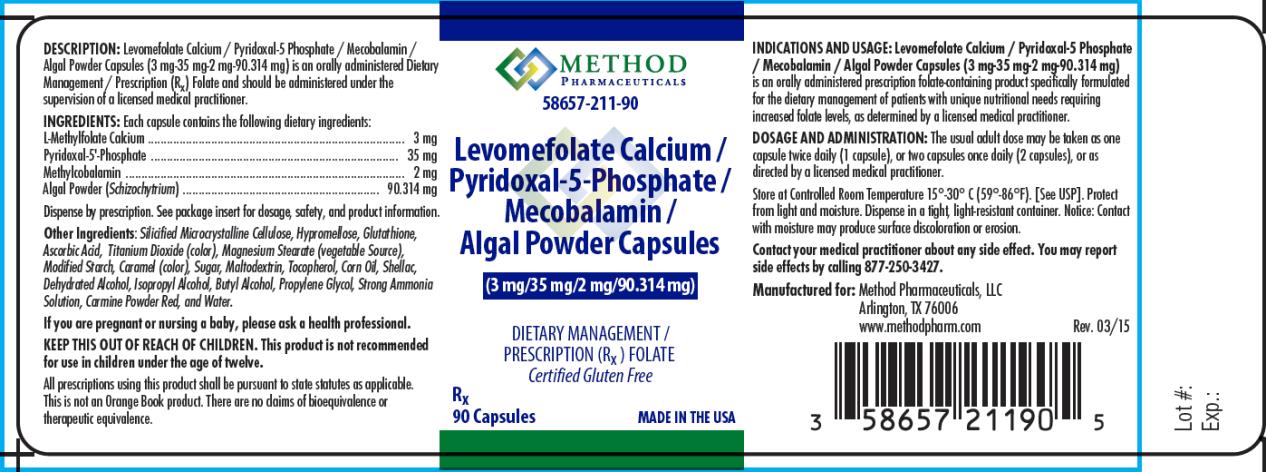
Levomefolate Calcium Pyridoxal-5 Phosphate Mecobalamin Algal while Breastfeeding
What is Levomefolate Calcium Pyridoxal-5 Phosphate Mecobalamin Algal used for?
Can I continue breastfeeding if I am using Levomefolate Calcium Pyridoxal-5 Phosphate Mecobalamin Algal? How long does it stays in breast milk?
Levomefolate Calcium Pyridoxal-5 Phosphate Mecobalamin Algal Breastfeeding Analsys
Pyridoxal phosphate anhydrous while Breastfeeding
SafeCAS Number: 54-47-7
Concentration of vitamin B6 in the breast milk is directly related to the amount present in diet with the possibility of a high increment by an excessive consumption through the diet. Daily allowance of vitamin B6 ranges from 2 to 3 mg. A balanced and varied diet is enough without a need for extra supplementation with this vitamin. Vitamin B6 deficiency is extremely rare since it is widely distributed in many foods. In those cases where supplementation is required, it is recommended not to exceed 40 mg a-day. There are controversial data on the capacity of a high dose of Pyridoxine to inhibit the secretion of Prolactin and suppress the milk production. The American Academy of Pediatrics rates it as usually compatible with breastfeeding.
Methylcobalamin while Breastfeeding
SafeCAS Number: 13422-55-4
Vitamin B12 exists naturally in milk at a concentration of 1 nanogram / mL (range: 0.3 to 3 ng / mL). Maternal supplementation with cyanocobalamin barely increases milk levels in well-nourished women (Sandberg 1981), but it does improve the levels in women of low socioeconomic status (Sneed 1981). The concentration in colostrum is up to 28 times higher than that of mature milk.The daily requirements for Vitamin B12 are 2.4 micrograms and increase to 2.8 micrograms daily during breastfeeding. Foods rich in vitamin B12 are meat, offal, eggs, dairy products, salmon, sardines, clams and fortified cereals. With a varied and balanced diet no vitamin supplements are needed, but B12 deficiency has been observed in the plasma and milk of women with strict vegetarian diets (vegans), malabsorptive diseases (eg, Crohn's disease, celiac disease), bariatric surgery, poor nutritional status, pernicious anemia, low socio-economic status and in cases of natural disasters or wars. There are numerous publications showing that infants of these mothers are at high risk of disease due to vitamin B12 deficiency, which can lead to anemia, stunting and psychomotor retardation. "Flash pasteurization" applied to breast milk of mothers who are HIV+ does not decrease vitamin B12 concentration. American Academy of Pediatrics: medication usually compatible with breastfeeding (AAP 2001).
I already used Levomefolate Calcium Pyridoxal-5 Phosphate Mecobalamin Algal and meanwhile I breastfed my baby should I be concerned?
Not much study has been done on safety of Levomefolate Calcium Pyridoxal-5 Phosphate Mecobalamin Algal in breastfeeding and its ingredients. Even we do not have complete information about usage of Levomefolate Calcium Pyridoxal-5 Phosphate Mecobalamin Algal in breastfeeding so at this point a trained medical professional could be your best bet. If you observe anything abnormal with your baby please contact 911.
My health care provider has asked me to use Levomefolate Calcium Pyridoxal-5 Phosphate Mecobalamin Algal, what to do?
If your doctor considers Levomefolate Calcium Pyridoxal-5 Phosphate Mecobalamin Algal safe enough to prescribe for you that means its benefits should outweigh its known risks for you.
If I am using Levomefolate Calcium Pyridoxal-5 Phosphate Mecobalamin Algal, will my baby need extra monitoring?
We are not Sure, Please check with your healthcare provider or doctor.
Who can I talk to if I have questions about usage of Levomefolate Calcium Pyridoxal-5 Phosphate Mecobalamin Algal in breastfeeding?
US
National Womens Health and Breastfeeding Helpline: 800-994-9662 (TDD 888-220-5446) 9 a.m. and 6 p.m. ET, Monday through Friday
UK
National Breastfeeding Helpline: 0300-100-0212 9.30am to 9.30pm, daily
Association of Breastfeeding Mothers: 0300-330-5453
La Leche League: 0345-120-2918
The Breastfeeding Network supporter line in Bengali and Sylheti: 0300-456-2421
National Childbirth Trust (NCT): 0300-330-0700
Australia
National Breastfeeding Helpline: 1800-686-268 24 hours a day, 7 days a week
Canada
Telehealth Ontario for breastfeeding: 1-866-797-0000 24 hours a day, 7 days a week
